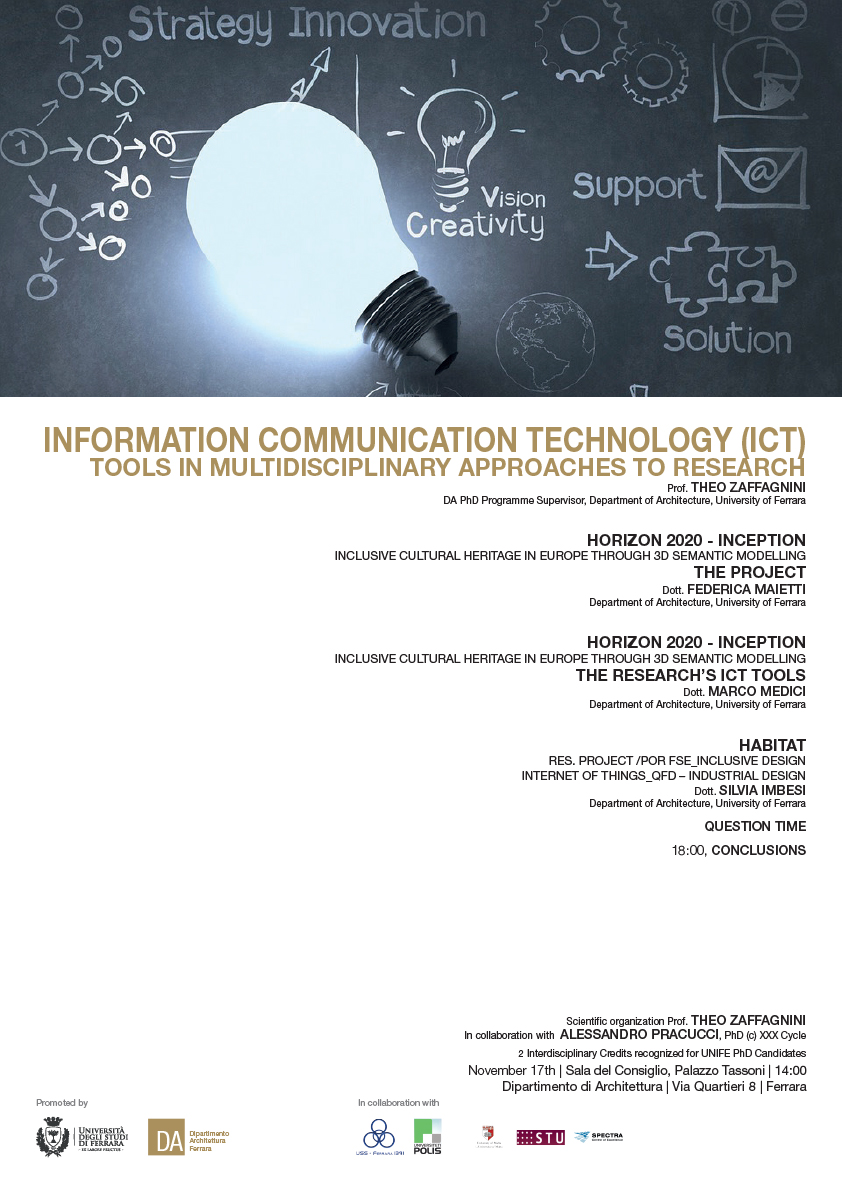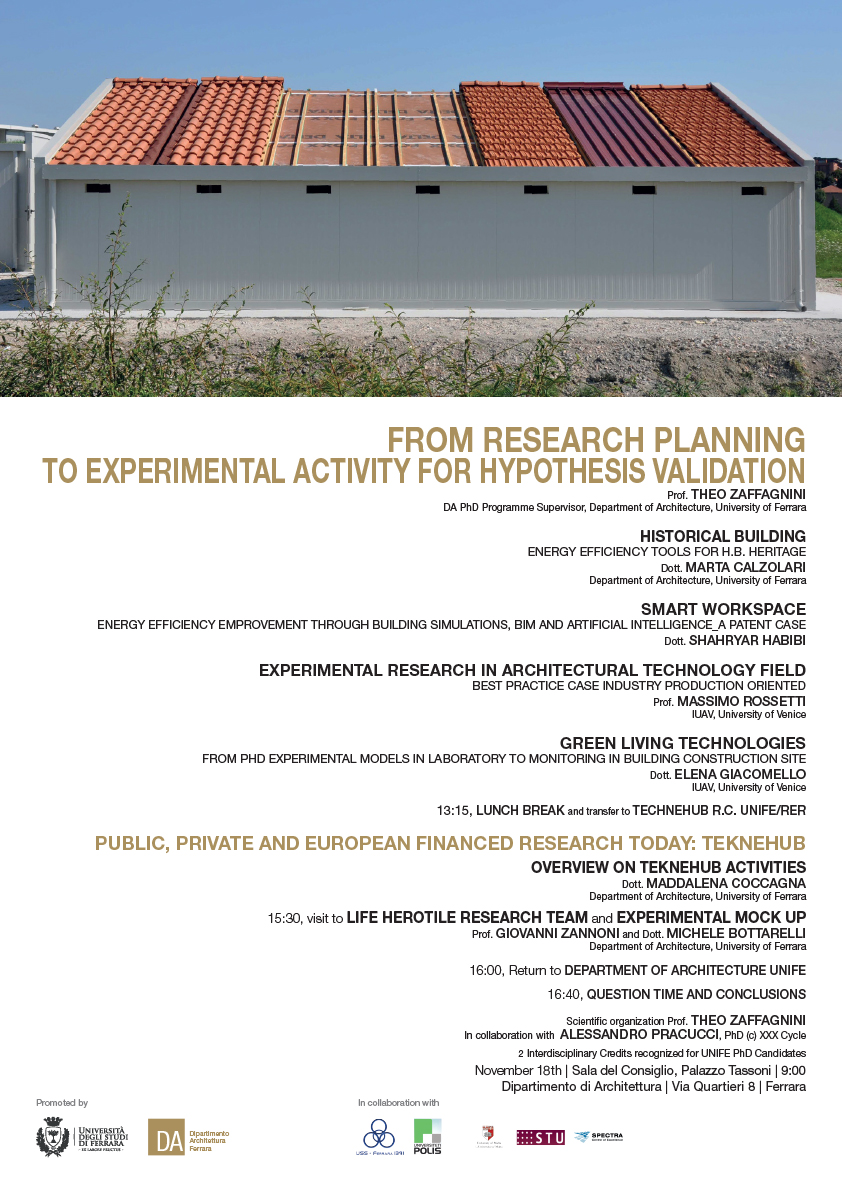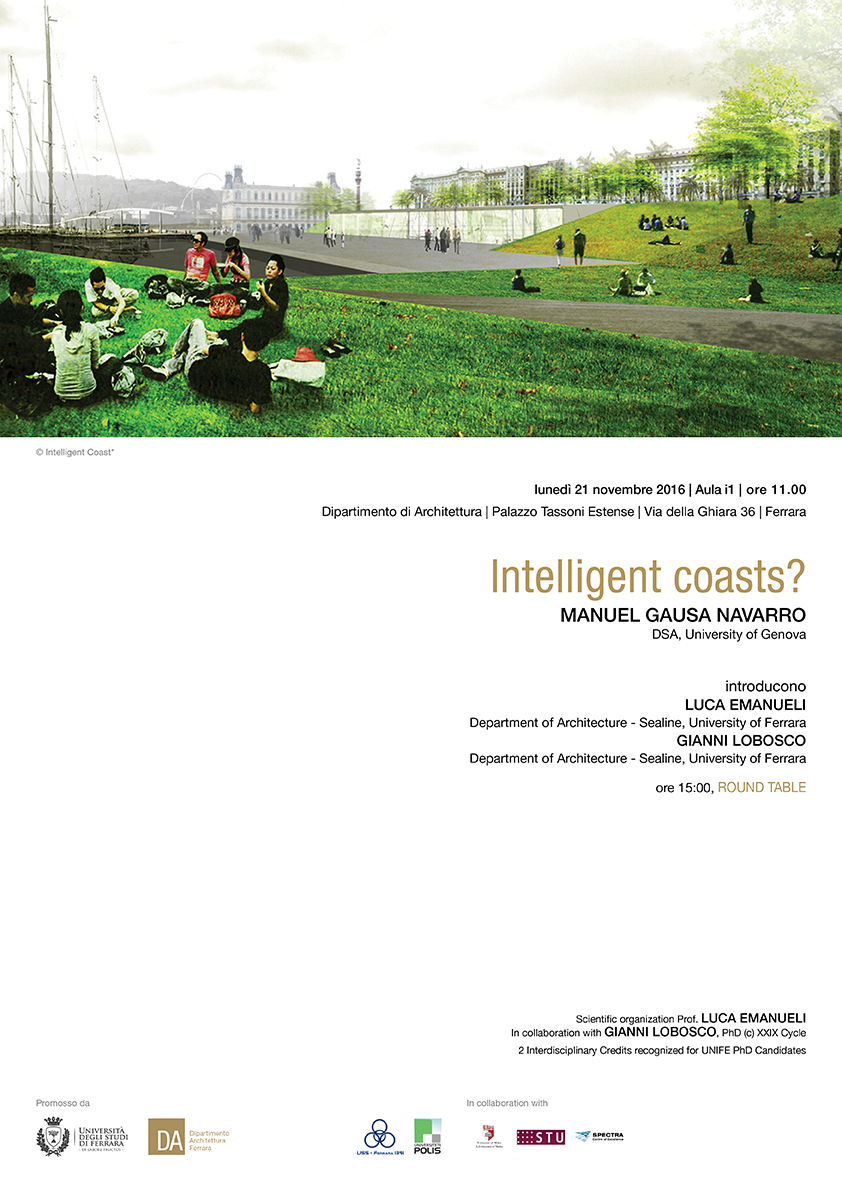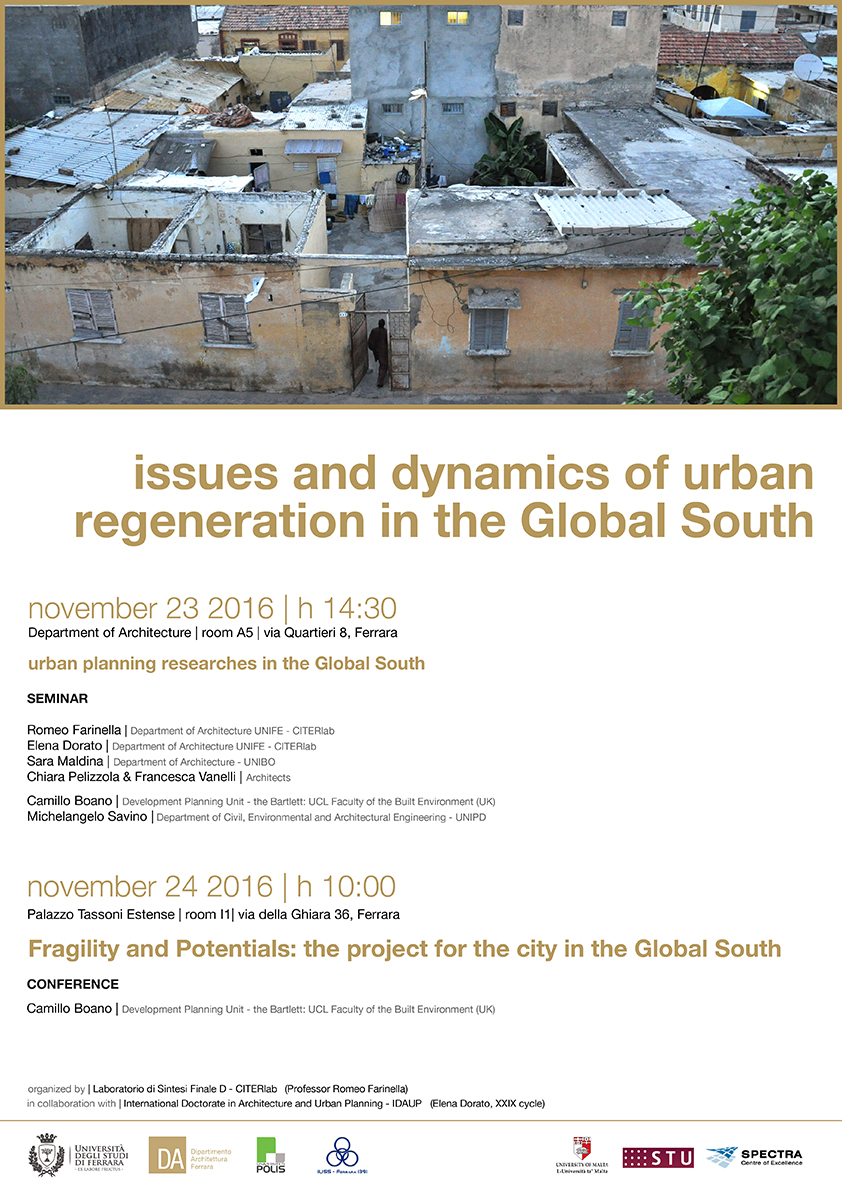Third International PhD Workshop Doctorate Architecture and Urban Planning (IDAUP) XXX, XXXI and XXXII cycle Ferrara, Nov 17th - 25th 2016
Dettagli dell'evento
Quando
al 25/11/2016 alle 18:25
Persona di riferimento
Strategies, Tools and Anticipatory Images for Contemporary Research
University of Ferrara_Department of Architecture
IDAUP PhD Programme partners:
University of Ferrara_Department of Architecture and POLIS University of Tirana (ALB)
IDAUP PhD Programme Associate Members
University of Malta I Faculty for the built environment (MT)
Slovak University of Technology STU Bratislava (SLK) I Institute of Management
University of Pècs I Faculty of Engineering and Information Technology.
Strategies, Tools and Anticipatory Images for Contemporary Research
Un workshop internazionale al Dipartimento di Architettura dell’Università di Ferrara
Aderire ad un percorso dottorale, è oggi per i giovani ricercatori un’occasione per ripensare alle competenze acquisite in ambito formativo e professionale all’interno del complesso e articolato scenario dell’architettura. La consapevolezza di quello che si è chiamati ad affrontare rappresenta un primo passo necessario e dovuto per dare ai futuri studiosi gli strumenti per poter operare in autonomia, ma soprattutto in team, nel percorso di ricerca intrapreso. In questo scenario diviene fondamentale e centrale la creazione di percorsi formativi che possano offrire al dottorando un confronto sempre aggiornato sulle teorie, gli strumenti metodologici, procedurali ed esperienziali, tali da consentirgli un controllo della propria ricerca. Ciò si colloca in un momento storico particolare dove tempi, metodi, significati e complessità risultano amplificati da obiettivi e scenari globalmente condivisi. Il tutto tristemente gravato da ricorrenti criticità emergenziali da superare. Il necessario approccio multidisciplinare delle ricerche al pari della multicriterialità applicabile agli approfondimenti da condurre rilanciano, soprattutto oggi, logiche di consapevolezza dei principali metodi scientifici adottati e dei lessici delle diverse discipline dell’architettura. In questo stimolante e al contempo ambizioso quadro si inserisce l’offerta formativa del Terzo Workshop Internazionale dell’International Doctorate in Architecture and Urban Planning (IDAUP) del Dipartimento di Architettura dell’Università di Ferrara con la Polis University di Tirana e i loro Associate Members 2016. Una raccolta di esperienze internazionali e nazionali di ricerca, di racconti di percorsi scientifici ricercatamente disomogenei tra loro. Ricerca teorica nell’ambito della progettazione architettonica, ambientale, tecnologica e dell’urbanistica o esempi d’innovazione e sperimentalismo (e di brevetto dei risultati ottenuti), poco significano nella loro singolarità, ma nel loro complesso - se ben amalgamate ad azioni formative e di critica – si crede garantiscano, la giusta qualità e quindi l’attualità, della formazione dottorale. Il Workshop, attraverso l’organizzazione di momenti formativi seminariali, vuole essere appunto per i dottorandi l’occasione per seguire questo ambizioso percorso indagando alcuni interessanti casi scientifici in atto negli ambiti curriculari Architecture e Urban Planning che caratterizzano il Programma.
17 Novembre 2016

Le tematiche trattate dal seminario ICT Tools in multidisciplinary approaches to Research tentano ambiziosamente di proporsi, nell’ambito della cultura tecnologica, come testimonianze di esperienze proiettate al superamento di confini operativi conosciuti. La realtà di tecnologie immateriali o digitali applicate agli scenari tipici della progettazione architettonica e tecnologica, si propongono infatti oggi come apparenti esemplificazioni di quel “gioco infinito” rappresentato dalla ricerca scientifica in cui i ricercatori coinvolti sono i giocatori. Scrive lo studioso americano J.P. Carse “I giocatori “finiti” giocano all’interno dei confini. I giocatori “infiniti” giocano con i confini. (..) I giochi infiniti sono i più misteriosi. Il loro scopo non è vincere, ma assicurarsi la continuità del gioco. Le regole possono cambiare, i confini possono cambiare, perfino i partecipanti possono cambiare, ma al gioco non è mai permesso di giungere alla fine.(…)”1 . I Ph.D. Federica Maietti e Marco Medici sono stati invitati a presentare il progetto europeo INCEPTION_ Inclusive Cultural Heritage in Europe through 3D Semantic Modelling finanziato nell'ambito del Programma Horizon 2020 e coordinato dal Dipartimento di Architettura di Ferrara (Coordinatore Scientifico Prof. R. Di Giulio). Il progetto si propone di sviluppare metodologie innovative per la realizzazione di modelli 3D interoperabili con un approccio inclusivo ai Beni Culturali, in grado di arricchire la conoscenza interdisciplinare dell’identità culturale europea da parte di diversi profili di utenza, dagli studiosi ai ricercatori, professionisti e curatori, fino agli utenti non esperti. Un esempio di ricerca fortemente multidisciplinare e innovativa sia per gli strumenti adottati che per i suoi ambiziosi obiettivi quali la creazione di procedure, metodologie di acquisizione e modellazione 3D. Scopo ultimo per la conservazione, valorizzazione, progettazione e gestione dei patrimoni culturali.
Alla Dott.ssa Silvia Imbesi spetterà il compito di descrivere altre dinamiche innovative in atto presso il Tecnopolo TekneHub di Ferrara. In particolare il progetto di ricerca HABITAT ossia “Home Assistance Basata su Internet of Things per l’Autonomia di Tutti”, una ricerca sviluppata nell’ambito disciplinare dell’Industrial Design, finanziata dal Programma Operativo Regionale FESR 2014-2020 e finalizzata allo sviluppo dell’User Centered Design, Inclusive design con prototipizzazione e test di smart objects."
Nota
1. cfr. James P. Carse, “Finite and Infinite Games. A vision of Life and Possibility”, Ballantine Books, New York, 1986, ISBN 0-345-34184-8.
18 Novembre 2016

Il seminario “From Research Planning to Experimental Acitivity for Hypothesis Validation” si prefigge di fornire spunti di approfondimento circa la validazione delle ipotesi teoriche emergenti dalle ricerche dottorali e non. L’azione di ricerca svolta in ambiti d’avanguardia pone infatti il ricercatore sia nelle condizioni di dover dimostrare la fondatezza delle ipotesi da lui formulate, che di garantire la replicabilità di modelli teorici innovativi per il raggiungimento degli obiettivi prefissati della azione condotta. La sperimentazione è parte integrante ed anticipatoria della ‘reificazione’ del progetto architettonico richiedendo, per questo, trasversali competenze multidisciplinari. Ad essa va associato l’assoluto rigore nella definizione di metodi, nel controllo e interpretazione dei dati empirici emergenti e la capacità di efficace sintesi dei risultati sono determinanti per il successo della ricerca. Quali sono quindi le responsabilità e le specifiche qualità richieste al ricercatore in questo processo? Quali le esigenze, le criticità progettuali da affrontare, gli sbocchi operativi? Quali i limiti di competenza o i compiti di regia da intraprendere in azioni sperimentali? Si sono volute declinare queste tematiche in modo articolato e scalare invitando al racconto di specifiche esperienze di best practice un gruppo di relatori - omogeneo per formazione – che ha raggiunto risultati di eccellenza, in ambiti nazionali ed internazionali, attraverso validazioni sperimentali e prototipizzazioni finalizzate al brevetto. Sia giovani Ph.D, come la Dott.ssa Marta Calzolari e il Dott. Shahryar Habibi, che docenti e ricercatori progettisti tecnologi come il Prof. Ph.D Massimo Rossetti e la Dott.ssa Ph.D. Elena Giacomello dallo IUAV di Venezia.
La formazione dottorale - oggi più che mai - deve ambire al “saper fare”, ma soprattutto al “saper fare squadra”, ossia alla comprensione e condivisione delle logiche della multidisciplinarietà applicata. Anche per questo si è scelto di concludere il seminario con la visita al centro di ricerca TekneHub di Ferrara. Qui la Dott.ssa Ph.D Maddalena Coccagna illustrerà ai partecipanti le attività in atto e in esordio di diversi gruppi di ricerca. Qui si avrà inoltre conto dai responsabili scientifici del Dipartimento di Architettura, il Prof. Ph.D Giovanni Zannoni e il Dott. Ing. Michele Bottarelli e dagli altri membri gel gruppo di ricerca del progetto europeo finanziato LIFE Herotile con visita ai laboratori di ricerca e al modello sperimentale al vero presente al TekneHub.
21 Novembre 2016

Dopo sette anni dal primo simposio tenuto a Barcellona dal Professor Manuel Navarro Gausa (UNIGE) sugli impatti del turismo sui sistemi e sulle città metropolitane del bacino Mediterraneo, quest'evento vuole proporre ai laureandi e agli studenti di dottorato una revisione critica di quel primo lavoro, raggiunta attraverso anni di ricerche fino all'elaborazione di nuove teorie. Gausa terrà una conferenza intitolata come quel primo simposio, ma con un punto interrogativo alla fine, sollevando cioè nuove questioni: “Intelligent Coasts?”.
Da dove inizia il progetto di una regione metropolitana turistica come Barcellona e come può essere ridefinito oggi? Come si misura la capacità turistica? Quali sono gli indicatori per bilanciare l'area d'influenza di una metropoli costiera e turistica? Qual è il suo livello di competitività oggi, all'interno di un mercato in cerca di differenziazione qualitativa invece che surplus quantitativo? Barcellona, il principale caso studio del dibattito, vuole essere una metropoli creativa e turistica, capace di accettare la sfida di reinventarsi e di concepire nuovi criteri per un modello urbano di qualità e coerente con la sua vocazione.
23-24 Novembre 2016

DINAMICHE E PROBLEMATICHE DELLA RIGENERAZIONE URBANA NEL GLOBAL SOUTH
L'evento si articola in due diverse iniziative: un seminario a più voci durante il quale verrano presentate alcune tesi di laurea e progetti di ricerca svolti negli ultimi anni all'interno del Dipartimento di Architettura UNIFE (Saint-Louis du Senegal, Il Cairo, L'Havana) e che sarà introdotto, mediato e arricchito dai contributi esperti del Professor Romeo Farinella (DA - Centro di Ateneo per la Cooperazione allo Sviluppo Internazionale - UINFE), del Professor Camillo Boano (UCL - Londra) e del Professor Michelangelo Savino (DCEAE – UNIPD) in qualità di discussant. Una conferenza dal titolo “Fragility and Potentials: the Project for the City in the Global South” tenuta dal Professor Boano, Direttore della Development Planning Unit della Bartlett Faculty of the Built Environment.
Finalità principale dell'iniziativa è quella di presentare esempi di percorsi di progettazione urbana in alcuni paesi del Global South, le sfide principali e ricorrenti, così come possibili metodologie e processi per gestirle. L'approccio seminariale faciliterà il dialogo tra i partecipanti, garantendo agli studenti del V anno e ai dottorandi di partecipare attivamente al dibattito.
25 Novembre 2016
Il seminario vuole proporre una riflessione sui metodi e gli obiettivi di un PhD sui temi del progetto di architettura. In particolare sul rapporto tra ricerca applicata e ricerca teorica in relazione ai temi del progetto di architettura alle diverse scale di intervento. Antonino saggio, coordinatore da diversi anni del Dottorato in Teorie e progetto dell’Università La Sapienza di Roma porterà il suo contributo sul tema partendo dall’esperienza svolta nei vari cicli di Dottorato romano, ma anche forte della sua esperienza di ricerca nel campo dell’Information Tecnology applicata ai temi del progetto di architettura.
COORDINATORI E PARTECIPANTI
Coordinatore International Doctorate Architecture and Urban Planning (IDAUP) I International Doctorate Architecture and Urban Planning Coordinator
UniFe_Dipartimento di Architettura di Ferrara in consorzio con Polis University di Tirana, Albania, con gli Associate Consortium Members University of Malta (MLT), Slovak University of Technology (STU) of Bratislava (SLK), University of Pècs, Pècs (HUN)
Roberto Di Giulio (UniFe)
DA PhD Programme Supervisor IDAUP
Theo Zaffagnini (UniFe)
Coordinamento Scientifico Third DA PhD International Workshop IDAUP
I Scientific Coordinators of the Third DA PhD International Workshop IDAUP
Luca Emanueli (UniFe)
Romeo Farinella (UniFe)
Antonello Stella (UniFe)
Theo Zaffagnini (UniFe)
Coordinamento iniziative per LSF D-E I LSF D-E Event coordinators
Romeo Farinella (UniFe)
Luca Emanueli (UniFe)
Organizzazione e Coordinamento PhD Candidates Third DA Workshop IDAUP
Organization and Coordination PhD Candidates Third DA Workshop IDAUP
Elena Dorato (Architect, PhD cand. IDAUP/UniFe)
Gianni Lobosco (Architect, PhD cand. IDAUP/UniFe)
Alessandro Pracucci (Architect, PhD cand. IDAUP/UniFe)
Relatori I Speakers
Federica Maietti (Architect, Assistant Professor, UniFe_DA)
Marco Medici (Architect, PhD, Research Fellow, UniFe_DA)
Silvia Imbesi (Architect, PhD, Research Fellow, UniFe_DA)
Marta Calzolari (Architect, PhD, Research Fellow, UniFe_DA)
Shahryar Habibi (Architect, PhD)
Massimo Rossetti (Architect, Associate Professor, IUAV-Venezia)
Elena Giacomello (Architect, PhD, Lecturer, IUAV-Venezia)
Maddalena Coccagna (Architect, Assistant Professor, UniFe_DA)
Giovanni Zannoni (Architect, Associate Professor, UniFe_DA)
Michele Bottarelli (Engineer, Assistant Professor, UniFe_DA)
Manuel Gausa Navarro (Architect, Full Professor, UniGe_DSA)
Gianni Lobosco (Architect, PhD cand. IDAUP/UniFe)
Elena Dorato (Architect, PhD cand. IDAUP/UniFe)
Sara Maldina (Architect, PhD cand. UniBo_DA)
Chiara Pelizzola (Architect)
Francesca Vanelli(Architect)
Camillo Boano (Architect, Senior Lecturer, The Bartlett Development Planning Unit-UCL, UK)
Michelangelo Savino (Architect, Associate Professor, UniPd_ICEA)
Antonino Saggio (Architect, Full Professor, La Sapienza Roma_Department of Architecture)
Romeo Farinella (Architect, Associate Professor, UniFe_DA)
Luca Emanueli (Architect, Full Professor, Phd, Director DA Research Centre Sealine UniFe)
Theo Zaffagnini (Architect, Associate Professor, UniFe_DA, Phd Programme Supervisor IDAUP)
Antonello Stella (Architect, Associate Professor, UniFe_DA)
ENGLISH TEXTS
Strategies, Tools and Anticipatory Images for Contemporary Research
An international workshop in the University of Ferrara at Department of Architecture
Attending a PhD programme is an opportunity for the young researchers to rethink their competences acquired during training or professional activities inside the complex and structured architectural scenario. Increasing the awareness and capture adequate tools to face this new challenge is a crucial step to research independently and in team. In this context, the development of proper training courses is fundamental to design a complete and up-to-date framework on theories, methodologies, procedures and operative tools to address and allow a full control of the PhD candidate’s research activity. In particular such a need for educational attention, it is basilar in the current peculiar historic moment where time, methods, consequences and complexities are amplified by global shared aims and perspectives, sadly affected by emergencies criticalities. The indispensable multidisciplinary approach in researches, related to the in-depth multicriteria analysis, needs to raise awareness on scientific methodologies and instruments adopted by each different architectural disciplines. Inside this inspiring and ambitious outline, the Third PhD International Workshop - International Doctorate Architecture and Urban Planning (IDAUP) takes place at the Department of Architecture at University of Ferrara with the Polis University of Tirana and their Associate Members 2016. The designed educational path is a collection of national and international experiences and scientific reports exposition, chosen to present the largest possible scientific approaches to research. Theoretical researches on architectural, environmental, technological and urbanistic design process, and innovation examples and experiments towards patent results, are parts of a common educational doctoral training, melted together as a unique complex and updated proposal able to achieve high quality standards in PhD candidates’ formation. Throughout Seminars and Conferences, the Workshop is an opportunity to know and go deep inside the current scenario thanks to case studies related to PhD programme curricula, Architecture and Urban Planning.
November 17th, 2016
The different topics that will be covered in the Seminar titled “ICT Tools in multidisciplinary approaches to Research” should attempt ambitiously to offer themselves – within technology culture field – as demonstrative evidences of crossing known operating boundaries. The reality of Intangible or Digital Technologies, applied to architectural and technological design scenery, seems nowadays as a kind of mirror of that “infinite game” that is considered the scientific research, where the players involved are the researchers. As wrote by J.P. Carse “Finite players play within boundaries; infinite players play with boundaries. (…) But infinite games are more mysterious. Their object is not winning, but ensuring the continuation of the play. The rules may change, the boundaries may change, even the participants may change – as long as the game is never allowed to came to an end.”1 Dr. Ph.D Federica Maietti and Dr. Ph.D. Marco Medici were invited to present the european Research Project INCEPTION_ Inclusive Cultural Heritage in Europe through 3D Semantic Modelling. A Research Project funded by Horizon 2020 Framework and coordinate by the Department of Architecture of Ferrara (Scientific Coordinator Prof. R. Di Giulio). The project aims to develop innovative methodologies to build 3D interoperable models for an inclusive approach to Cultural Heritage, capable to increase an interdisciplinary knowledge of the cultural European identity by different kind of users, from students to researchers, (architectural) professionals and curators, to unskilled users. An example of an innovative and strongly multidisciplinary research both for the adopted tools and for the ambitious goals it set as the creation of procedures, methodologies of 3D scan and modelling. Ultimate goals are the conservation, valorization, design and management for the cultural heritage.
Dr. Silvia Imbesi is called to describe the innovative dynamics in place at the Tecnopolo TekneHub Res. Center of Ferrara. Specifically the research project HABITAT “Home Assistance Based on Internet of Things to reach Autonomy for all users” will be presented. A research funded by Operative Regional Programme FESR 2014-20, operative within the Industrial Design scientific field, aimed to develop the User Centered Design, the Inclusive Design, and the prototyping (and tests) of smart objects.
Note
1. see James P. Carse, “Finite and Infinite Games. A vision of Life and Possibility”, Ballantine Books, New York, 1986, ISBN 0-345-34184-8.
November 18th, 2016
The seminar “From Research Planning to Experimental Activity for Hypothesis Validation” aims to focus on how the theoretical hypothesis validation process comes to light from specific doctoral or alternative research paths. An avantgarde research experience leads indeed the researcher both to be obliged to demonstrate the validity of his hypothesis, and to assure the possibility of replication of innovative theoretical models aimed to achieve the predetermined goals of the experience. Experimentation is an integral and ahead of the times element of the architectural design building or ‘reification’ and for this reason it needs cross multidisciplinary skills of the involved researchers. This had to be linked to the absolute strictness in methods definition, to the control and understanding of the emerging empirical data and to the ability to efficaciously summarize the outcomes to lead the research to success. Which are the accountabilities and specific skills requested to the researcher in this domain? Which are the requirements, the design criticalities to be faced and which could be the operational outcomes? Which are the proficiency boundaries or the coordination tasks to apply in experimental action? It has been pointed to decline these topics in a scalar articulated way through the description of specific best practices experiences by a homogeneous group of speakers according to their academic training that has reached excellence results, nationally and internationally, through experimental validations and prototype making activities directed to patent. Both young Ph.D, as Dr. Marta Calzolari and Dr. Shahryar Habibi, and professors and researchers architectural technology designers as Prof. Ph.D. Massimo Rossetti and Dr. Ph.D Elena Giacomello from IUAV in Venice. The Doctoral formation – now more than ever – has to aim not just to the “knowhow”, but overall to the “team work knowhow”, this to the comprehension and the sharing of the principles of the applied multidisciplinary. Also for this reason it has been decided to end the seminary with a visit to the TekneHub Research Centre in Ferrara.
Here, Dr. Ph.D Maddalena Coccagna will show to the participants the ongoing and starting activities of various research teams. Following the scientific research coordinators Prof. Ph.D Giovanni Zannoni and Dr. Eng. Michele Bottarelli, with other members of the research team, will introduce the European funded Research Project LIFE Herotile including the visit of the Research Labs and of Experimental Mock Up realized at TekneHub.
November 21st, 2016
After seven years from the first symposium held in Barcelona by Professor Manuel Navarro Gausa (UNIGE) on the impacts of tourism on metropolitan systems and cities around the Mediterranean, the event wants to propose to graduating students and PhD candidates a critical revision of that first work carried out through research up until the elaboration of new theories. Gausa will give a conference with the very same title of the famous symposium, but adding a question mark at the end, posing new questions: “Intelligent Coasts ? ”.
Where does the Project of a Tourist Metropolitan Region like Barcelona start and how is it being redefined nowadays? How is its tourist capacity measured? What are the indicators to level the influence area of a coastal tourist metropolis? What is its current competitiveness level within a market in search of qualitative differentiation more than quantitative surplus? Barcelona, which is the main case studies of debate, wants to be a creative and a tourist metropolis that accepts the challenge of reinventing itself through a new tale, capable of drawing up new criteria for an urban model with quality of life and coherent with its vocation of tourist destination.
November 23rd-24th, 2016
ISSUES AND DYNAMICS OF URBAN REGENERATION IN THE GLOBAL SOUTH
The event is structured upon two different initiatives: firstly, a collective seminar during which some of the latest researches and Master's thesis conducted within the Architecture Department UNIFE will be presented (Saint-Louis du Senegal, Cairo, La Havana); it will be introduced and moderated by some experts in the field, as Professor Romeo Farinella (DA – University Center for International Development Cooperation – UINFE), Professor Camillo Boano (UCL – London), and Professor Michelangelo Savino (DCEAE – UNIPD) as discussants. Secondly, a conference titled “Fragility and Potentials: the Project for the City in the Global South” held by Professor Boano, Director of the Bartlett Faculty of the Built Environment's Development Planning Unit.
The main aim of the event is to present examples of urban planning carried out in some of the Global South countries, identifying the major and most recurring challenges and issues as well as presenting possible methodologies and processes to manage them. The seminar approach will ease communication and the exchange of ideas, allowing V year students and PhD candidates to actively participate to the debate.
November 25th, 2016
The seminar aims to propose a Thought on a PhD on issues of architectural design methods and objectives. In particular on the relationship between applied and theoretical research in relation to issues of architectural design at different scales of intervention. Antonino Saggio, coordinator for several years of the PhD in Theory and project of the University La Sapienza of Rome will bring his contribution on the theme starting from the experience took place in all the roman PhD cycles, but also the strength of its research expertise in the field of ' Information Technology applied to issues of architectural design.

